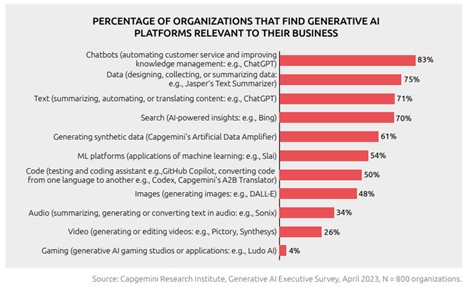Artificial intelligence that can generate original text, images and more is capturing executive attention across sectors. So-called generative AI represents the latest frontier in AI adoption. Nearly all organizations surveyed recently have these tools on their boardroom agendas.
The new research by Capgemini indicates over half of executives globally say their leadership strongly advocates for generative AI, like chatbot ChatGPT. Another 40% have even budgeted dedicated teams, signaling extraordinary interest barely six months since the technology debuted.
Far from fearing disruption, most see generative AI’s potential to enhance products, marketing, sales and operations. Expected benefits over the next three years run as high as 9% including cost cuts, revenue gains and customer satisfaction.
Applications span industries, from aerospace to pharma. Over 40% of aerospace companies pilot generative AI for complex 3D modeling of plane components, for example. Drug discovery and healthcare data are top use cases in over a third of pharma firms.
Across sectors, information technology leads in perceived promise and early adoption. Two-thirds of executives ranked IT highest for driving innovations via tools like coding assistants. Over half are piloting or using generative AI in IT already.
Given vast data access, financial services, retail and telecom also actively pilot applications in areas ranging from personalized marketing to customer service chatbots.
“We’ve found many organizations already experimenting across use cases,” notes Mark Roberts, Principal Technologist at Capgemini. However, there are barriers to scale.
The biggest challenges are understanding how underlying training data may skew outputs, ensuring transparency and managing unintended biases. Tools often hallucinate facts seemingly with great confidence. Strict governance and human oversight are critical.
There are also mounting environmental concerns given the huge computing power required for advanced neural networks. Training can emit over 500 metric tons of carbon dioxide emissions. Queries too command outsized energy needs compared to standard search engines.
So while benefits beckon, realizing the promise takes preparation and responsibility. As Mark Oost, Capgemini’s AI Global Lead concludes, “Used judiciously, such technologies promise to accelerate discovery by augmenting human capabilities.” The technology remains in a growth phase. Striking the right balance will likely involve experience, ethics and emerging regulations.
If organizations in every industry approach opportunities with care, this new AI generation may yet achieve its potential to uplift business and society together. But the technology should complement human intelligence rather than ever replace it.



